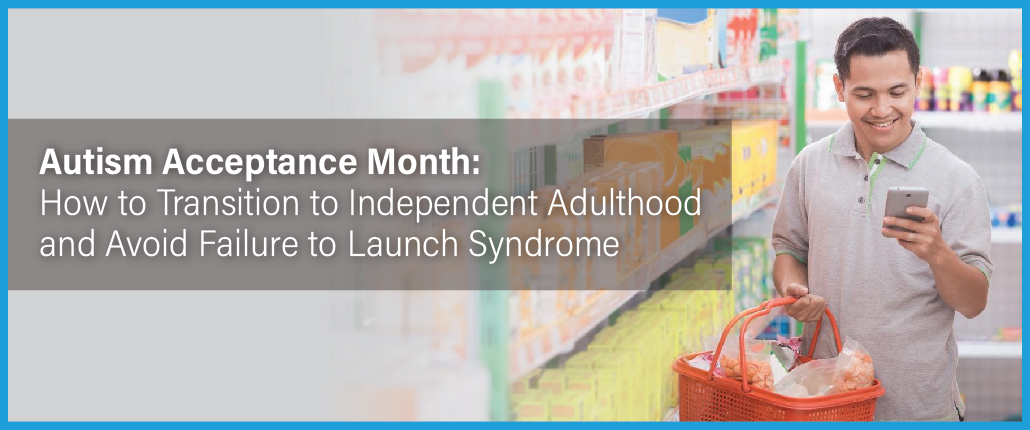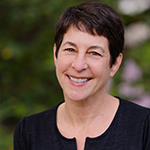
Autism Acceptance Month
April is Autism Acceptance Month, a time to increase understanding and acceptance of people with autism, and to provide continued support, kindness, and compassion for the
Autism Community. The hope is to ignite change through improved support and opportunities in all areas of life including education, employment, and independent living.
What is Failure to Launch Syndrome?
Young adults with autism spectrum disorder (ASD) often find the transition time after high school especially challenging. A recent study by the AJ Drexel Autism Institute Life Course Outcomes Program revealed that about one-third of high school graduates with ASD attend college, less than 20% of adults with ASD live independently, and less than 60% of adults with ASD have a job. This data means that many young adults with ASD struggle to live independently. The media often refers to this concept as “failure to launch” and usually with a humorous twist. But for the parents of these young adults with ASD, and the young adults themselves, this can be a very challenging and frustrating time.
Why can transitioning to independent adulthood be tough for autistic young people?
It is understandable why life after high graduation can be overwhelming for young adults with ASD. Life during high school is often very regulated due to parent involvement with getting ready for school, taking care of transportation, meal preparation, and the handling of financial issues. Teens with ASD are generally not confronted by many daily decisions.
But then graduation arrives and once the celebrations and parties are over, teens and parents are faced with the scary and confusing question, “What happens next?”
Facing this open ended question can cause some young people with ASD to withdraw and isolate as a coping mechanism. Another common coping strategy is excessive computer use as an escape from the stress of parents’ and societal expectations. Parents sense that their young adult child wants social connections, an interesting job or academic success but they see that their child doesn’t seem to know how to take the steps to achieve these goals. Parents often describe their young adult as “stuck”.
How can you help your young adult get “unstuck?”
But rather than dwell on the failure to launch aspect, a more positive approach is to help young adults with ASD to get “unstuck” and move forward with their lives. One way to approach this is to have a conversation with the young adult, determine an achievable goal, and set out what small steps need to be taken to achieve that goal.
For example, if the idea of attending college feels insurmountable, maybe taking just one interesting, but not too challenging, class may be acceptable. The goal doesn’t have to be getting an “A” but rather the beginning of a sense of mastery and competence. Once there is a foundation of achievement, further success can then be built. A next step could be enrolling in two classes the next semester, or staying with one class and adding on a part-time job.
If a young adult’s goal is job obtainment, then a small step toward that goal may be volunteering at an organization of interest. Volunteering is a great way to learn how to function in a work environment, how to make small talk and show interest in your colleagues, and the importance of being on time. Once there is success at the volunteer position, a next step can be obtaining a part-time paid position.
Adopting a Positive and Supportive Mindset is Key
It can be difficult for parents of young adults with ASD to see the young adult children of their fellow parents moving out of the family home and onto independent adult lives. A good mantra to keep in mind is, “Compare and despair.” Dr. Laurie Stephens, Senior Director of Autism Programs at The Help Group offers this perspective, “You can take a train or a plane from Los Angeles to Washington, DC. It may be faster to get there by plane, but the train will get there all the same, just at a later date.”
The sooner a young person is provided opportunities for taking responsibility and managing aspects of their life, the sooner that person may be able to launch successfully to independent adulthood. There are mentors, therapists, and Life Skills Coaches available to offer support and guidance to young adults and help them take their first steps into independent adulthood. It will happen!
To learn more about Advance LA’s life skills coaching and social groups for young adults or the parent support group, reach out to [email protected].

Jeri Rochman, JD, MS
Jeri Rochman, JD, MS, is the Advance LA Director of Community Outreach, a Life Skills Coach, National Board Certified Counselor and Certified Parent Educator. Interested in learning more about Advance LA’s services?